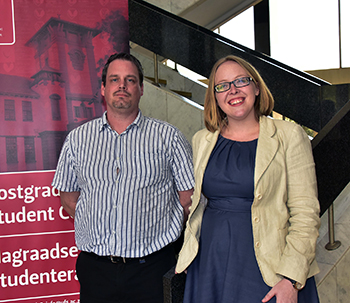Latest News Archive
Please select Category, Year, and then Month to display items
27 December 2021
|
Story Jóhann Thormählen
|
Photo Supplied
 The Kovsie Annerie Dercksen is one of South Africa’s most promising youngsters and climbing the cricketing ladder.
The Kovsie Annerie Dercksen is one of South Africa’s most promising youngsters and climbing the cricketing ladder.
She enjoyed every second of playing with some of her heroes and believes the exposure to international cricket will help her become a better player.
Annerie Dercksen is one of South Africa’s most promising youngsters and climbing the cricketing ladder.
Star from Beaufort West
This second-year Education student from the University of the Free State (UFS), who dreams of playing for the Momentum Proteas, represented the South African Emerging Women’s team three times in 2021.
The star from Beaufort West toured with the side to Bangladesh and also played against Zimbabwe and Thailand in One Day and T20 matches.
According to Dercksen, it is an incredible honour and privilege to be a part of a side.
She soaked up the experience and says everyone was willing to share their knowledge.
“I would have to say, sharing the field with some of my heroes and getting to work with some of the best coaches in the country are some of the highlights.”
She says each tour brought its own challenges and this helped her grow in the way she views and approaches the game.
“In Bangladesh we played against a well-established team in foreign conditions while facing a lot of spinners in spin friendly conditions. Personally, it was quite a challenge and I had to come back and work on some options, especially against spin.”
“Each tour brought its own challenges and this helped me grow in the way I view and approach the game.” - Annerie Dercksen
Coming through the ranks
The all-rounder has come through the ranks. She represented South-Western Districts at school level, played for the South African U19 side and is currently representing the Free State.
But Dercksen didn’t always dream cricket, especially not when playing ‘backyard’ cricket with her brother on the farm.
She didn’t even play for a team at school. “Until a boy from our primary school’s team got sick before a game. A teacher came to class and asked, ‘who can play cricket’, and I put up my hand.”
National 3MT competition held at UFS
2017-03-29

The two winners of the Three minute thesis
competition, Andrew Verrijdt (left) and
Kerryn Warren (right).
Photo: Charl Devenish
From Neanderthal hybrid children to eating corn silk as a way of managing kidney diseases, the National Three Minute Thesis competition (3MT) captivated the mind.
“We brought the competition to South Africa and hosted the local, regional, and national competitions for the past few years,” said Dr Emmie Smit, organiser of the event. It is an opportunity to raise the profile of postgraduate research and to develop a cross-disciplinary student community to effectively communicate research to a wide audience. The event was founded by the University of Queensland, Australia. The third national 3MT competition took place at the University of the Free State (UFS) on Friday 24 March 2017.
Three minutes and one slide
During the competition, participants had three minutes to explain their master’s or doctoral research and one static PowerPoint slide could be used. “It is very important that this slide works for you. There must be some way the information on the slide connects to what you present,” said Dr Henriette van den Berg, Director of the Postgraduate School at the UFS.
Winners grateful for opportunity
“It is an honour and a drive. It is very nice to have this sort of thumbs up,” said Kerryn Warren, winner of the Science category. Her research title was, What did a Human-Neanderthal Child Look Like? “I have been looking at the hybrids between different species and subspecies of mice in order to use them as a model to find out what human hybrids looked like.”
The presentation by Andrew Verrijdt, winner of the Humanities category, entitled Hiding in the Deep: Anonymous Websites for Paedophiles on the ‘Darknet’, gave a glimpse into the mysterious and dangerous realm of the dark web. “I am grateful for the opportunity. Primarily because I think it’s an important topic, and society will benefit by getting the word out there as it is a sensitive topic,” he said. The two winners, both from the University of the Cape Town, won R15 000 each. A further R30 000 of prize money went to the four runners-up.